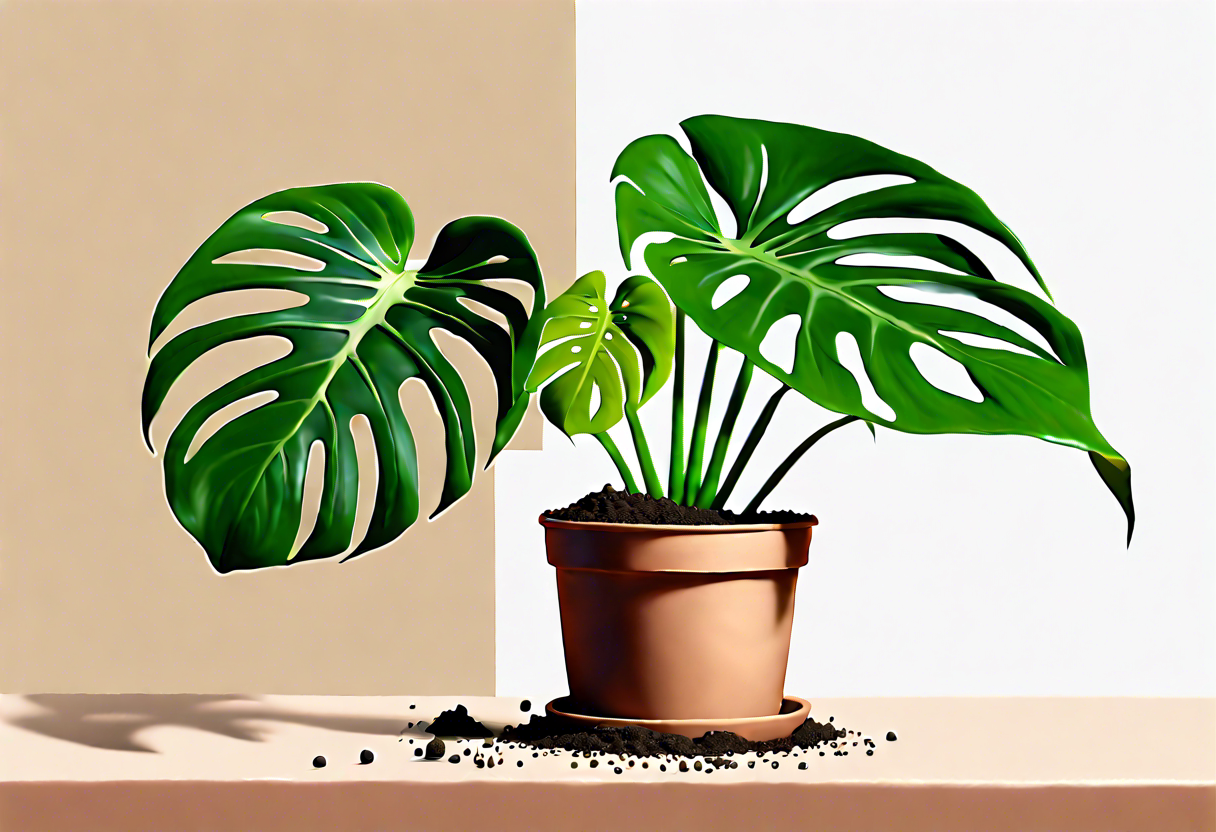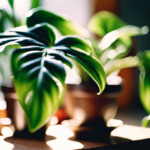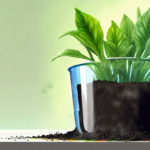Key Features of the Best Soil or Potting Mix for Swiss Cheese Plant
When it comes to caring for your Swiss Cheese Plant (Monstera deliciosa), one of the key factors in ensuring its health and vitality is the soil or potting mix you choose. The right soil not only provides the necessary nutrients for the plant to thrive but also promotes proper drainage and aeration. In this article, we will explore the key features of the best soil or potting mix for Swiss Cheese Plant.
One of the most important features of Swiss Cheese Plant soil is good drainage. These plants prefer slightly moist soil, but they do not tolerate waterlogged conditions. Therefore, it’s crucial to choose a well-draining potting mix that allows excess water to flow through and prevents the roots from sitting in standing water. This is essential to prevent root rot and other moisture-related issues that can negatively impact the plant’s health.
Another important consideration is the soil’s ability to retain moisture. While it’s crucial to provide proper drainage, it’s equally important for the soil to retain enough moisture to keep the plant hydrated. A balance between drainage and moisture retention is key. This is particularly important in drier environments where maintaining adequate hydration can be a challenge.
Swiss Cheese Plants thrive in soil that is rich in organic matter. Organic matter helps improve the soil’s fertility, moisture retention, and overall structure. Compost, well-rotted manure, and leaf mold are examples of organic materials that can be incorporated into the potting mix to enhance its nutritional value and improve the plant’s growth and development.
In addition to organic matter, the soil should also contain a balanced mix of essential nutrients. Nitrogen, phosphorus, and potassium are the primary macronutrients that plants require for healthy growth. Micronutrients such as iron, magnesium, and calcium are also essential, albeit in smaller quantities. A high-quality potting mix formulated specifically for Swiss Cheese Plant or other tropical foliage plants usually contains these essential nutrients in the correct proportions.
While some gardeners prefer to purchase pre-mixed potting soil, others opt for creating their own DIY potting mix. If you choose to create your own, you can start with a base of peat moss or coconut coir, which helps with moisture retention. To improve drainage, you can add perlite or vermiculite. Adding organic matter, such as compost or well-rotted manure, will provide the necessary nutrients.
The best soil or potting mix for Swiss Cheese Plant should have good drainage, moisture retention, be rich in organic matter, and contain a balanced mix of essential nutrients. Whether you choose to purchase pre-mixed potting soil or create your own DIY mix, ensuring these key features are present will help your Swiss Cheese Plant thrive and flourish. Remember to monitor the moisture levels, provide proper lighting, and regularly fertilize your plant to promote healthy growth. With the right soil, you’ll be on your way to enjoying the beauty of this stunning tropical plant in your home or garden.
Importance of Well-Draining Soil for Swiss Cheese Plant Growth
The Swiss Cheese Plant (Monstera deliciosa) is a popular choice for indoor gardening due to its unique and attractive foliage. To ensure optimal growth and health for your Swiss Cheese Plant, it is crucial to provide it with the best soil or potting mix. One of the key factors to consider is the importance of well-draining soil.
Well-draining soil is essential for Swiss Cheese Plants because they are native to tropical rainforests, where they grow on the forest floor or climb up trees. In their natural habitat, the soil is loose and rich in organic matter, allowing for excellent drainage. Mimicking these conditions in a potting mix will help prevent waterlogged roots, which can lead to root rot and other plant health issues.
When the soil around the roots of a Swiss Cheese Plant is overly saturated, it restricts oxygen availability, leading to suffocation of the roots. This can cause stunted growth, yellowing leaves, and ultimately, the demise of the plant. By using well-draining soil, excess water can easily flow through the pot, preventing water from pooling around the roots and promoting healthy root development.
So what makes a soil mix well-draining? One essential component is the use of coarse materials such as perlite, pumice, or coarse sand. These additives create air pockets in the soil, allowing excess water to drain away rapidly. A good proportion for a well-draining potting mix would include approximately 30% perlite or coarse sand. This ensures that water moves efficiently through the soil without causing it to become waterlogged.
In addition to coarse materials, incorporating organic matter into the soil mix is also important. Organic matter, such as compost or well-rotted manure, improves soil structure and retains moisture while still allowing excess water to drain away. Aim for a mix that consists of approximately 50% organic matter. This will provide essential nutrients and support the overall health and vigor of your Swiss Cheese Plant.
It is essential to choose a pot with drainage holes to allow excess water to escape freely. Placing a layer of pebbles or broken pottery at the bottom of the pot can help prevent soil from blocking the drainage holes, ensuring proper water flow.
Providing your Swiss Cheese Plant with well-draining soil is crucial for its growth and overall health. The use of coarse materials, such as perlite or coarse sand, and incorporating organic matter into the potting mix will help create an ideal growing environment. Remember to choose a pot with drainage holes to prevent waterlogged roots. By giving your Swiss Cheese Plant the best soil or potting mix, you are setting it up for success and ensuring a thriving and stunning addition to your indoor garden.
Key Features of the Best Soil or Potting Mix for Swiss Cheese Plant
When it comes to cultivating a healthy and thriving Swiss Cheese Plant (Monstera deliciosa), choosing the right soil or potting mix is crucial. The ideal soil composition provides a well-balanced environment for the plant’s roots to grow and absorb essential nutrients. Here are the key features to look for in the best soil or potting mix for your Swiss Cheese Plant.
-
Well-Draining: Swiss Cheese Plants are native to rainforests, where their roots thrive in well-draining soil. Avoid heavy clay soils that tend to retain moisture, as this can lead to root rot. Look for a potting mix that contains ingredients like perlite, vermiculite, or pumice to enhance drainage.
-
Moisture Retention: Although the soil needs to drain well, it should also retain moisture to ensure that the Swiss Cheese Plant’s root system is adequately hydrated. Look for a potting mix that contains organic matter such as peat moss or coconut coir, which can retain water while still allowing excess moisture to drain.
-
Nutrient-Rich: Swiss Cheese Plants require a nutrient-rich soil to support their growth and development. Opt for a potting mix that is enriched with organic matter like compost, earthworm castings, or well-rotted manure. These organic amendments provide essential nutrients and improve the overall fertility of the soil.
-
pH Level: Swiss Cheese Plants thrive in slightly acidic to neutral soils. The pH level of the potting mix should ideally be between 6.0 and 7.0. You can use a soil pH testing kit to determine the acidity of your chosen potting mix or create a DIY mix with the desired pH level using amendments like peat moss or lime.
-
Sterile and Disease-Free: To prevent the introduction of pests and diseases, it is essential to choose a potting mix that is sterile and free from pathogens. Avoid using garden soil in your pots, as it can contain harmful organisms that may cause damage to your Swiss Cheese Plant. Opt for commercially available potting mixes that are specially formulated for indoor plants.
Creating the best soil or potting mix for your Swiss Cheese Plant can also be done as a DIY project. To do this, combine equal parts of peat moss or coconut coir, perlite, and compost or well-rotted manure. This mixture provides excellent drainage, sufficient moisture retention, and a good nutrient balance.
Choosing the best soil or potting mix for your Swiss Cheese Plant involves considering key features such as well-draining properties, moisture retention, nutrient content, pH level, and sterility. By providing the ideal soil conditions, you can ensure that your Swiss Cheese Plant thrives and grows into a beautiful and healthy specimen.
Tips for Creating a DIY Potting Mix for Swiss Cheese Plant
The Swiss Cheese Plant, scientifically known as Monstera deliciosa, is a popular choice among indoor plant enthusiasts due to its striking foliage and low maintenance requirements. One crucial factor in ensuring the optimal growth and health of this tropical plant is to provide it with the right soil or potting mix. While pre-packaged potting mixes are readily available in the market, creating a DIY mix allows you to tailor the composition according to the specific needs of your Swiss Cheese Plant. Here are some tips to help you create the best potting mix for your beloved Monstera deliciosa.
1. Well-Draining Base: Swiss Cheese Plants thrive in well-draining soil that prevents water from pooling around the roots. Begin by creating a base using a mix of peat moss, which retains moisture, and perlite or coarse sand, which adds drainage and aeration. Aim for a ratio of 2 parts peat moss to 1 part perlite or sand. This blend ensures that excess water drains away efficiently, preventing root rot and other water-related issues.
2. Organic Matter: organic matter into the potting mix is essential for providing essential nutrients to your Swiss Cheese Plant. Adding compost or well-rotted manure enriches the soil with organic nutrients, improves its structure, and enhances water retention capacity. Aim to include around 20-25% organic matter in your DIY potting mix.
3. Balanced pH: Swiss Cheese Plants prefer slightly acidic to neutral soil with a pH range between 5.5 and 7. To ensure the correct pH level, you can use sphagnum peat moss, which is naturally acidic. Alternatively, you can adjust the pH by adding dolomite lime to increase alkalinity or sulfur to decrease alkalinity. Regularly testing the pH of the soil will help maintain the optimal conditions for your plant’s growth.
4. Essential Minerals: In addition to organic matter, your DIY potting mix should contain essential minerals to support the Swiss Cheese Plant’s growth. Adding a slow-release fertilizer or incorporating mineral-rich amendments like bone meal, rock phosphate, or kelp meal will provide a steady supply of nutrients over time. These amendments not only nourish the plant but also enhance root development and overall vigor.
5. Avoid Compacting: It is crucial to create a potting mix that remains loose and well-aerated. Avoid using heavy soils that tend to compact over time, leading to poor drainage and root suffocation. Regularly inspect the potting mix and loosen it by gently fluffing it with a fork or your hands. This practice promotes root growth and prevents the accumulation of excess moisture.
6. Sterilization: Prior to potting your Swiss Cheese Plant, it is advisable to sterilize the potting mix to eliminate any potential pests, diseases, or weed seeds. You can achieve this by baking the soil in an oven at 180°F (82°C) for approximately 30 minutes. This simple step helps create a clean and healthy environment for your plant to thrive.
By following these tips, you can create a DIY potting mix that fulfills the specific requirements of your Swiss Cheese Plant. Remember to regularly monitor the moisture levels, adjust watering accordingly, and provide your Monstera deliciosa with adequate light to ensure its successful growth and stunning foliage display.
The Importance of Choosing the Right Soil for Swiss Cheese Plant
When it comes to the proper care of your Swiss Cheese Plant (Monstera deliciosa), choosing the right soil or potting mix is crucial. This tropical plant, known for its distinctive leaf holes, requires specific soil conditions to thrive and reach its maximum growth potential. In this article, we will explore the key factors to consider when selecting the best soil for your Swiss Cheese Plant.
The first and most important feature of a suitable soil or potting mix for your Swiss Cheese Plant is good drainage. These plants prefer soil that allows excess water to flow through quickly, preventing the roots from becoming waterlogged. A well-draining soil mix allows oxygen to reach the roots, promoting healthy growth and preventing root rot. It also helps to maintain the right balance of moisture, keeping the plant hydrated without causing water-related issues.
To ensure proper drainage, the ideal potting mix for a Swiss Cheese Plant should be lightweight and porous. You can achieve this by incorporating ingredients such as perlite, vermiculite, or coarse sand into the soil mix. These additives promote aeration and drainage, preventing water from pooling and causing damage to the roots.
In addition to good drainage, it is important to consider the organic content of the soil. Swiss Cheese Plants generally prefer a slightly acidic to neutral pH range of 5.5 to 7.0. organic materials like peat moss, well-rotted compost, or coco coir into the soil mix can help to maintain this pH balance and provide essential nutrients to the plant.
Organic soil amendments not only improve the moisture-holding capacity of the soil but also enhance its overall fertility. They introduce beneficial microorganisms that aid in nutrient absorption and break down organic matter, making nutrients more readily available to the plant’s roots. Using organic amendments also promotes a healthier soil ecosystem, which in turn benefits the overall plant health and growth.
While it is possible to purchase pre-mixed potting soil specifically formulated for Swiss Cheese Plants, you can also create your own DIY mix. A basic recipe for a Swiss Cheese Plant potting mix includes equal parts of peat moss, perlite, and high-quality potting soil. However, it’s important to note that the exact proportions may vary depending on your specific environmental conditions and the needs of your plant.
Choosing the right soil or potting mix for your Swiss Cheese Plant is vital for its overall health and growth. A well-draining mix with good organic content will provide the optimal conditions for your plant to thrive, preventing issues such as root rot and nutrient deficiencies. Whether you opt for a commercially available mix or decide to create your own, ensuring the soil meets the specific needs of your Swiss Cheese Plant will help you create an optimal environment for its successful development.
Conclusion
Choosing the best soil or potting mix for your Swiss Cheese Plant (Monstera deliciosa) is crucial for its overall health and growth. Key features to look for include a well-draining soil that allows excess water to escape and prevents root rot. Organic amendments can provide essential nutrients and improve the soil structure, while synthetic amendments offer convenience and a controlled nutrient release. When creating a DIY potting mix, it is essential to strike a balance between water retention and drainage. However, several common mistakes should be avoided, such as using compacted soil, overwatering, or neglecting the importance of aeration. By following these guidelines, you can provide the best possible growing environment for your Swiss Cheese Plant.
The Swiss Cheese Plant thrives in well-draining soil due to its susceptibility to root rot. A suitable potting mix should allow excess water to escape freely, preventing waterlogging and the subsequent rotting of the plant’s roots. This is vital for the overall health and growth of the Swiss Cheese Plant, as it ensures proper nutrient uptake and prevents the development of fungal diseases associated with overly wet conditions. By choosing a well-draining soil mix, you are creating an optimal environment for your Swiss Cheese Plant to flourish.
When deciding on soil amendments for your Swiss Cheese Plant, you have the option to choose between organic and synthetic materials. Organic amendments, such as compost and well-rotted manure, provide a natural source of nutrients and improve the soil structure. This enhances water retention and allows beneficial microbial activity. On the other hand, synthetic amendments, like slow-release fertilizers, offer convenience and a controlled release of nutrients. Depending on your preferences and resources, you can choose the amendment that best suits your gardening style and priorities.
If you prefer a do-it-yourself approach, creating a homemade potting mix for your Swiss Cheese Plant is an excellent option. A simple recipe includes a combination of peat moss, perlite or vermiculite, and organic matter like compost or well-rotted manure. This blend provides a well-draining medium with sufficient water retention and nutrient availability. Experimenting with different ratios can help you find the perfect mix for your plant’s needs. Additionally, adding organic amendments like worm castings or coconut coir can further enhance the soil’s structure and nutrient content.
Despite the importance of selecting the right soil mix for your Swiss Cheese Plant, several common mistakes should be avoided. Using compacted soil is one such mistake, as it restricts root growth and inhibits proper drainage. Overwatering is another common error, as it can lead to waterlogged soil and root rot. It is crucial to allow the soil to dry out slightly between waterings to prevent these issues. Furthermore, neglecting the importance of aeration can hinder the plant’s growth. Regularly loosening the soil or using materials like perlite can improve aeration and promote healthy root development.
By considering the key features of the best soil mix, emphasizing the importance of well-draining soil, understanding the options between organic and synthetic amendments, and following tips for creating a DIY potting mix, you can provide the ideal growing conditions for your Swiss Cheese Plant. Avoiding common mistakes such as using compacted soil, overwatering, or neglecting aeration will ensure that your plant thrives and exhibits its iconic fenestrated leaves, becoming a delightful addition to your indoor or outdoor garden space.


